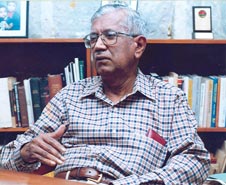I had wondered whether I should publicise my thoughts and memories about my senior, Mr. H. L. de Silva, President’s Counsel, but then, a few months ago, Amarasiri Panditharathna, Attorney-at-Law, invited me to write to the Law Journal published by the Kaduwela Bar Association.
I was told to limit myself to one A4 page. I limited my article to “Mr. H. L. de Silva the Lawyer”, without any reference to the private individual, my memories of whom are abundant. A year after his demise, I have been requested to send my article to the press.
When I first met Mr. H. L. de Silva, he was handling three massive election petitions simultaneously, the ones following the 1983 by-elections for the Kalawana, Akmeemana and Mulkirigala electorates. I marvelled at how he could handle so much work at the same time. He told me it was a matter of organisation and commitment. The late Deshamanya E. D. Wikramanayake, V. W. Kularatne, Gomin Dayasiri, Nimal Siripala de Silva, and Javed Yusuf and a few others assisted him in those matters, and he had great faith in them.
 |
From the very beginning of my pupilage, Mr. H. L. de Silva impressed upon me three principal matters:
The first was not to go after money, but to keep working on standards of excellence in one’s professional work. He did not crowd his day with cases and more cases. He limited himself to one case a day. Sometimes he took two cases a day, but only if both cases were to be heard in the same court room. He said a lawyer owed it to his client to read the brief from cover to cover, study every minute detail, and fully research all aspects of the case.
The second was that brevity is the essence of all good drafting. This is something he said over and over again. I once submitted a draft in a writ application, where the client was Walker and Sons. I had laboured for a couple of days over a dozen pages. I showed him the draft, and in half an hour he had whittled it down to three-and-a-half pages. His edited version was more forceful and more effective.
The third was that the character ethic was more important than the personality ethic.
This he always maintained, while giving personality ethic its due place. The time I refer to was at least five years before the appearance of Stephen Covey’s book on the seven great habits of highly successful people.
Mr. H. L. de Silva fought his cases hard and long, but the fightwas clean all the way. His regular opponents were H. W. Jayewardene, QC; A. C. Gooneratne, QC; Eric Amarasinghe, PC; K. N. Choksy, PC; Nimal Senenayake, PC; N. R. M. Daluwatte, PC; L. C. Seneviratne, PC; P. A. D. Samarasekara, PC, and Faiz Mustafa, PC.
Those were the days when the Supreme Court and the Court of Appeal worked both sessions, forenoon and afternoon, and real substantive work was diligently conducted by all concerned. My senior was at the top of it all, committed to the cause at the highest level.
Once an opponent, a comparatively junior silk, called one night and told us not to get ready for the following morning’s case, as he would not be able to come to court. My senior told me not to take the opposing lawyer seriously, saying he would turn up in court in the morning with some lame excuse to us and then tell the court he was ready for the argument. Morning came, and lo and behold the opponent was there, with his lame excuse and telling court he was ready. My senior was thoroughly prepared and minutes into the argument had demolished his opponent’s case. We have related this story often, withholding the identity of the opposing counsel.
A striking quality in my senior was his humility. Two good examples come to my mind. The first involved myself. I was then a complete rookie, just one month into my pupilage. My senior was handling a final appeal regarding a piece of gem land in Eheliyagoda and a writ matter involving a tea factory in Morawaka. He had given me the two briefs earlier, and I had prepared the summaries after doing extensive research. In both cases, D. S. Wijesinghe, now a President’s Counsel, was the retained junior. My senior and he put their briefs aside and used the “mini briefs” I had prepared.
The second was in 1991, or 1992, when my senior started winding up his Court of Appeal practice. When asked why he was doing this comparatively early in his career, his reply was that “the juniors must also come up”. He made special mention of the late Lakshman Kadirgamar, who rose to prominence and became a President’s Counsel about three and a half years later. H. L. de Silva has gone before us. He will tarry in the good place till, God willing, we reach it ourselves. May he rest in peace.
Aravinda R. I. Athurupane |


